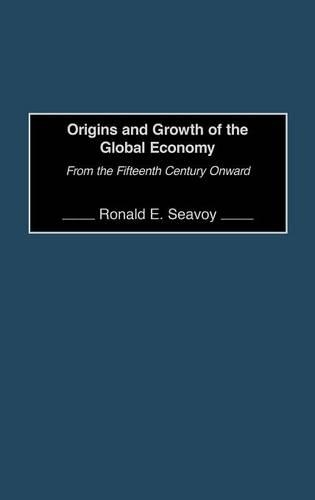
Origins and Growth of the Global Economy: From the Fifteenth Century Onward
(Hardback)
Publishing Details
Origins and Growth of the Global Economy: From the Fifteenth Century Onward
By (Author) Ronald E. Seavoy
Bloomsbury Publishing PLC
Praeger Publishers Inc
30th May 2003
United States
Classifications
General
Non Fiction
382.09
Physical Properties
Hardback
312
Description
The global market of the 21st century came into existence to produce products and services for mass consumption. Its purpose is to create consumer cultures in nations that fully participate in its benefits. It is the product of cooperation among industrial nations following World War II. Seavoy traces out the evolution of the global market from its foundations in imperial commercial rivalries of the mid-15th century to the present. The global economy rests on the foundation of imperial commercial rivalries that began when Columbus sailed west to America and da Gama sailed east to India. Thereafter, Spanish and Portuguese global commerce was challenged by the Dutch, English, and French. During the 19th century these nations rapidly expanded into the political vacuum of Africa and elsewhere because industrialization gave themand Germany, Japan, and Russiathe power to intrude into subsistence cultures worldwide. After World War II the political leaders of the United States and Western Europe were determined to end the imperial commercial rivalries that had contributed to World War I and World War II. Imperial commercial rivalries would be replaced by cooperative commercial politics among the principal industrial nations. Behind the shield of NATO, Western European nations and the United States devised rules and institutionalized them in the World Trade Organization, International Monetary Fund, European Union, and NAFTA that rapidly increased the volume of global trade. As Seavoy points out, increasing trade had three purposes, full employment in industrial nations which, in turn, would create the political stability needed for democratic governance, and the production of an abundance of products so that the citizens of participating nations could enjoy the benefits of consumer cultures. The creation of consumer cultures required the dissolution of obsolete empires and concentrating production on products for export among industrial nations. Nations that failed to fully participate rapidly fell behind in acquiring the technologies and management skills necessary to produce the abundance of products that could create consumer cultures. The global market and its derivative, consumer cultures, could only have come into existence during the peace following World War II. In Seavoy's analysis the absence of world wars results in a world where global economy and peace are synonymous terms. This is a sweeping synthesis that will be of interest to scholars, students, and the reading public interested in economic development and world economic history.
Reviews
[S]erves as a reminder that simple solutions (including those of the accuser and the accused in this case) will not solve complex problems with deep historical roots. Few readers will be able to deny that he has provoked them to think about the difficulties that underlie underdevelopment, even if the main source of that provocation is disagreement.-EH.Net
Encompassing a broad topic, this well-written account surveys the development of the global economy since the Portuguese and Spanish voyages of discovery in the 1400s....Recommended. Public and academic library collections, upper-division undergraduate and up.-Choice
"Serves as a reminder that simple solutions (including those of the accuser and the accused in this case) will not solve complex problems with deep historical roots. Few readers will be able to deny that he has provoked them to think about the difficulties that underlie underdevelopment, even if the main source of that provocation is disagreement."-EH.Net
"Encompassing a broad topic, this well-written account surveys the development of the global economy since the Portuguese and Spanish voyages of discovery in the 1400s....Recommended. Public and academic library collections, upper-division undergraduate and up."-Choice
"[S]erves as a reminder that simple solutions (including those of the accuser and the accused in this case) will not solve complex problems with deep historical roots. Few readers will be able to deny that he has provoked them to think about the difficulties that underlie underdevelopment, even if the main source of that provocation is disagreement."-EH.Net
Author Bio
RONALD E. SEAVOY is Professor Emeritus of History at Bowling Green State University. His most recent book is Subsistence and Economic Development (Praeger, 2000).
